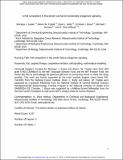A Raf-competitive K-Ras binder can fail to functionally antagonize signaling
Author(s)
Kauke, Monique Jacqueline; Tisdale, Alison W.; Kelly, Ryan Lewis; Hemann, Michael; Wittrup, Karl Dane; Braun, Christian Joerg; ... Show more Show less
Download1535-7163.MCT-17-0645.full.pdf (1.258Mb)
OPEN_ACCESS_POLICY
Open Access Policy
Creative Commons Attribution-Noncommercial-Share Alike
Terms of use
Metadata
Show full item recordAbstract
Mutated in approximately 30% of human cancers, Ras GTPases are the most common drivers of oncogenesis and render tumors unresponsive to many standard therapies. Despite decades of research, no drugs directly targeting Ras are currently available. We have previously characterized a small protein antagonist of K-Ras, R11.1.6, and demonstrated its direct competition with Raf for Ras binding. Here we evaluate the effects of R11.1.6 on Ras signaling and cellular proliferation in a panel of human cancer cell lines. Through lentiviral transduction, we generated cell lines that constitutively or through induction with doxycycline express R11.1.6 or a control protein YW1 and show specific binding by R11.1.6 to endogenous Ras through microscopy and co-immunoprecipitation experiments. Genetically-encoded intracellular expression of this high-affinity Ras antagonist, however, fails to measurably disrupt signaling through either the MAPK or PI3K pathway. Consistently, cellular proliferation was unaffected as well. To understand this lack of signaling inhibition, we quantified the number of molecules of R11.1.6 expressed by the inducible cell lines and developed a simple mathematical model describing the competitive binding of Ras by R11.1.6 and Raf. This model supports a potential mechanism for the lack of biological effects that we observed, suggesting stoichiometric and thermodynamic barriers that should be overcome in pharmacological efforts to directly compete with downstream effector proteins localized to membranes at very high effective concentrations.
Date issued
2018-05Department
Massachusetts Institute of Technology. Department of Biological Engineering; Massachusetts Institute of Technology. Department of Biology; Massachusetts Institute of Technology. Department of Chemical Engineering; Koch Institute for Integrative Cancer Research at MITJournal
Molecular Cancer Therapeutics
Citation
Kauke, Monique J., Alison W. Tisdale, Ryan L. Kelly, Christian J. Braun, Michael T. Hemann, and K. Dane Wittrup. “A Raf-Competitive K-Ras Binder Can Fail to Functionally Antagonize Signaling.” Molecular Cancer Therapeutics (May 2, 2018):.
Version: Author's final manuscript
ISSN
1535-7163
1538-8514
Keywords
Ras, targeted therapy, competitive inhibitor, cell signaling, mathematical modeling